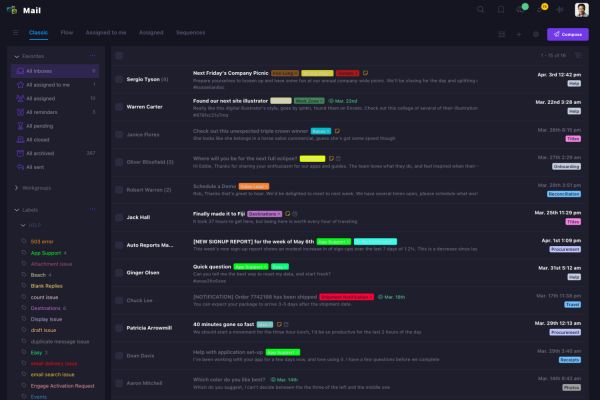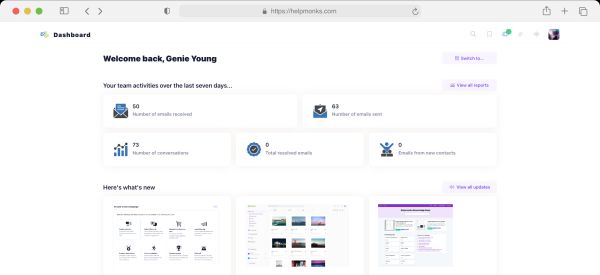
Mastering The Art of Dynamic Email Signatures
Dynamic email signatures increase brand visibility, build brand identity, and boost conversions. Learn how to create and update dynamic email signatures.
Read nowAre you interested in developing a quality customer support team? Well, that's not going to be easy, but it will certainly be rewarding.
Without an integral customer support team, you are left to your own devices or the outsourcing of critical work to sub-par teams. If you don't take ownership of your customer service, your business will have a poor reputation.
In this article, we will cover everything you need to know on how to build a customer support team. Thus, allowing you to get started as soon as possible and reap the benefits of deeper customer relationships.
Whenever you're ready to learn about the importance, efficacy, and usefulness of a customer support team, keep reading.
Developing a customer support team requires all of the people onboard to possess the understanding and qualifications to execute their work to the best of their ability. When it comes to identifying whether or not a customer support team is well-qualified, there are certain characteristics worth looking at.
Having a customer support team that is proactively serving the customers, you will be able to assist customers with problems before they are even aware of them. Being proactive in your approach makes clients feel heard and appreciated.
Having a customer support team that is struggling to maintain a conversation without frustration is going to be a problem. A customer support team is the first place people will go to when they want to be helped with respect and understanding. Temperance is crucial as a means of achieving calm patience.
A seasoned support specialist should be able to help with any problem, whether it's a tricky customer question or an issue of internal management. Problem-solving abilities can and should be developed regularly by the support team.
A support team should be able to maintain consistent communication and teamwork. This will ensure that their service results in productivity boosts, knowledge sharing between members, and critical thinking development.
Any type of software or chatbot can deal with a common support issue. But when the problems begin to become complicated, human communication is irreplaceable. The energy with which customers are served is one of the most important things that will make your clients feel good.
Your customer support staff can prepare for work with videos, roleplaying, tests, and much more. But there's always going to be a need for support to truly understand the business and product. You must ensure that your team members understand every aspect of what your enterprise has to offer.
Even though the terms do sound similar, these teams serve completely different purposes. The support team generally is bothered with technical support, responding to service or basic support requests from clients.
And even though they can handle complicated technical problems, it's the customer success team that must take your service to the upper echelon. They must be able to address issues beyond common bugs, they should understand how the customer uses the product, what the business involves and what the client will need in the future.
Unlike a support call center where anybody can help the client, your success team member must have defined customers and accounts that they work with regularly. The customer success team must be able to communicate easily that they are there to ensure the client is successful along their customer journey.
They must take customer feedback to others at the company, and each success team member must be able to deliver a certain level of service and care that results in long-term loyalty from clients.

Beyond the qualities that make up a good customer support team, the true power of support comes from the roles fulfilled on the team. Without capable employees fulfilling these roles, the support team might as well be outsourced to a location where each person is no better than the next.
Customer support specialists have a variety of responsibilities, such as understanding the needs of a client, resolving customer requests via phone. As well as responding to question via email or chat, addressing customer pain points and using CRM to assess and input customer information.
It's not enough for a support rep to simply read scripts and answer calls. Great support reps must have a good mix of soft and hard skills, such as patience, listening, time management.
They must also be knowledgeable on the company product, so they can strictly understand the common customer problems. If the rep does not know the product works, they will not be able to relate to the frustrations of the client and handle their request. They would have to send the customer to somebody else, which will only make the client more frustrated.
Another important trait for a rep is the passion for assisting others. Customer service reps are usually temporary entry-level positions, people don't seem to be passionate to have a long career in this field. This lack of passion will show on the surface how customers are being treated.
The next important role in your support team is a trainer. This is somebody who will help your reps get acquainted with tools and train them viscerally before they even have their first customer interaction.
In most cases, the greatest support trainer was a great support rep prior. They understand the ins and outs, the challenges, and the rewards. Besides that, they have also mastered the art of customer service through their learning and experience.
However, they should also be motivators and have natural teaching skills. The process of training reps is based on indicators and milestones that help track progress and reward employees for growth.
Some of the things covered by a trainer are CRM usage, people skill development, difficult customer handling, best practices for all support channels, specific product training.
The company must have a structured process for onboarding and mentor of new hires. This is important if you are planning on having a top-tier support team.
Experienced and trained reps need a great manager to help them. A support manager will maintain performance for the entire team. They will ensure ticket volume, resolution time, response time, customer satisfaction and net promoter score are up to expectations.
The manager can check for reps and how they handle their cases, they might also step in to help, even if it means working with customers. The support manager will ensure daily operations are maintained and will provide support to the infrastructure and processes of the department.
The manager must have customer support rep experience because they need to understand the differences between customer success and support. This is essential for them to take the team to the next level.
A Quality Assurance specialist will ensure that procedures are followed, and will continually monitor effectiveness and tone of call resolutions, email grammar, and practices on social media.
Because the QA also reported, they will know what is required to handle issues with success. With this understanding, the QAs will develop programs for assessment for the entire team.
Their primary role is to review and monitor calls. The QA will assess how reps manage calls, what tactics they use, and how effective their outcomes are. They will also examine the flow of conversation and how customers respond to the help provided.
They use the data to identify potential problems and risks, as well as recommend the training to build strengths out of weaknesses. Finally, they will also implement strategies for growing the current procedures.
Without a quality analyst on the team, you will find that your support team is suffering from many flaws, and that's the best-case scenario. In the worst case, you don't even realize you have these problems.
A recruiter is in charge of finding the best possible people to join your support team. They will implement and develop the strategy for recruiting, develop specifications and job descriptions. As well as perform task analysis to develop objectives and job requirements.
They will also source candidates from social media and databases, prepare materials for recruitment, post jobs on boards and networks. A recruiter is also responsible for screening applicants and their resumes, conducting interviews with recruitment tools, assessing experience, skills, and aptitudes.
You should look for experienced and smart recruiters who are capable of performing various interviews. They must be familiar with competency-based, stress, and structured interviews, but also the selection processes.
Recruiters should be great at interpersonal communication and have passion for the company mission. They are required to communicate with candidates on the benefits of working with this company.

Before you even begin to build your team, you should first determine what good customer service will look like to you. This is a critical point for everyone in the company to get on the same page. Not to mention, you will be able to create a philosophy for customer support.
When you're starting this project, you must outline the quality of service you want to provide. Once you have done this, you will be presented with core metrics (KPI) that you will measure.
The most important KPI to track are:
Using a KPI tool to create reports, you will be able to assess the satisfaction rate based on the percentage of closed-rated communication. You should try to get this percentage as high as you can.
Demos are critical for achieving high-quality leads because they will showcase the benefits of your service/product in real-time. Hence, it's important to expect how many demos you want to have per month. But also the rate of conversion from a demo to payment or subscription on your overall support request quantity.
Another important KPI to track is the number of reviews you have online. You should go for a number that's attainable without much loss. The number will be subjective to the industry, but it's always good to get a certain amount of reviews per month.
Even though upselling should never be the priority of your support team, they should be encouraged to engage in it when reasonable. Don't force them to upsell customers, but if they successfully do so and they do it several times, reward them.
When you hire people, don't try to limit their abilities. Let them be responsible for what they do, give them the authority to decide, and let them be creative. Training your support team to focus on the best interests of your customers is very important.
Providing customer service teams with a toolset so that they can work effectively is just as important. When choosing the tools for your support team, you can go with anything that works for you.
If it's knowledge-based, great. If it's email or live chat, great. Pick your poison. However, using omnichannel communication software is a great way to use all of the tools above, but ensure that your busy team is not stressed out.
Interact with all of your clients via a single dashboard. Look for a solution that includes all of the customer support channels, because that's the only way you will be able to reduce the load off your support team.
Motivated and happy support reps will result in happy and content customers. The majority of people who go through customer service will be willing to share their experiences with friends and family. Why don't you ensure this happens by encouraging and motivating your support teams?
There are so many ways for you to motivate your employees, resulting in an energetic and positive work environment. First, you should try to provide real-time feedback for customers. Use what customers are saying in their reviews to reinforce positivity.
Arrange team-building events for all departments. Get outside the office, wear regular clothes, come up with fun activities. Help employee morale stay loose and breaks the ice, don't be distant from your employees.
Develop an incentive program to offer promotions and better wages. Set up some perks for employee milestones. Understand that unlimited sick leaves won't ruin your business, have weeks off in some months.
Elaborate on how reps can make amends in poor customer interactions. Support reps have a difficult job. People come with their own tempers and backgrounds, support teams must learn how to negate the negativity of a bad customer experience.
Enforce competition as a natural friendly state of work. Gamify your hard work to make it more fun. Use skill levels for support agents to try and achieve. Give them badges or titles for issue resolution speed, customer satisfaction rates, or whatever comes to mind.
If you ever got yourself on a customer support line, how many times have you waited for a customer support rep or listened to on-hold music? Nobody wants to do this, it's daunting. People will get irritated if they cannot speak to someone real within the first several minutes.
Email chat is not live but it still removes that feeling of disconnect. Using canned responses to assist customers and save time is a great way to ensure timely responses. In a live chat, a single customer support rep can manage several conversations at once without depleting the quality.
It's always best to focus on fast replies to customer queries instead of being disappointed that they leave. Practical experience is necessary. Support teams must be fast at typing, they must come to answer resolutions faster and comprehend messages at a glance.

Even though it's obvious, most businesses disregard the importance of the client. Understanding the needs of the customer and becoming aware of what they want is critical.
First and foremost, you will be able to fine-tune your strategy per the most common wishes. Clients are the best beta-testers, they will help you find bugs to fix. Second, your support team will be able to gather feedback and use it to improve.
Not to mention, reviews can be used to shift your marketing and business efforts in the right direction. Finally, customer appreciation comes from listening to them, and if they had a good experience, they are more likely to share it with others.
Make use of online surveys, street-level user tests, usability examinations, and user research to catch up with customers. Find out what they think.
Each support team should have a complete view of the customer's journey. In most cases, they only see one side of the coin. They don't get to see everything the customer does before they make their purchase.
Marketing and sales departments handle other aspects of the customer's buying process. However, would it be useful for the support to partner with them? Of course, it might as well be a necessity.
You must encourage knowledge-sharing as part of departmental routines. This will ensure that departments share their energy with others, but also cooperate towards a common goal. Internal communication with clarity will set the route for how all management and staff interact.
There's always room to upgrade, but the right time only comes once, and it's more important. If support reps work with sales and marketing experts, they will know how to cross and upsell without intrusion.
On the other hand, sales and marketing can learn quite a bit from support teams. Allow your support teams to highlight the needs of the client, but also coach the others on content that should be formatted.
Working as a single unit is the most important thing a business can do. If your customers are interested in upgrading or demos, a customer manager should directly transfer them to a sales rep. Not to mention, developer teams can make useful integrations that create unions between the workflow of customer support and other departments.
Never rush your support team, take some time to understand your client base. Caring for your customers is much better than offering something they don't really want.
People like to be recognized and remembered. By recording their requests, interaction emphasis, and much more, you can develop better customer relationships.
By bridging the gap between the business and the customer with technology, you will earn a special place in their heart. For instance, if you sell interior decor, you could use AR technologies to show customers how the product will fit within their household.
Using this technology will also help you understand which products motivate purchasing behavior, allowing your business to promote the best benefits of your service or product. For example, you can gather the data to use it for segmentation marketing efforts on social media, retargeting campaigns, or email outreach efforts.
Now that you know how to build a customer support team with a strong emphasis on the client, you are well on your way to getting started and reap the benefits of this tedious work.
In any case, there's no rush to get this done. In fact, it's only better if you take it slow when building your service team from the ground up. Don't waste time on side activities and go full-force on creating a support team your customers are proud to come across with.
If you're interested in taking your customer engagement to the next level with modern technologies, as well as bridging the gap between departments in your business, get in touch with us and we will show you the power of our software.

Dynamic email signatures increase brand visibility, build brand identity, and boost conversions. Learn how to create and update dynamic email signatures.
Read now
Looking for an email marketing automation software? This guide shows what to look for. We'll also review the best tools for your online marketing needs.
Read now
Using customer engagement solutions helps you keep your existing customer base and grow. Here are the top 10 customer engagement solutions for your business.
Read now
Email management for team inboxes is only effective when used to its full potential. This guide has the 10 best practices for managing your team inboxes.
Read now
Empower your team and delight your customers.
